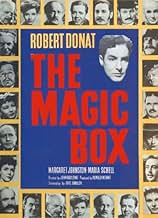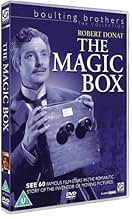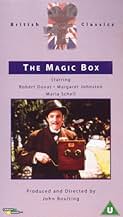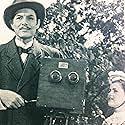IMDb-BEWERTUNG
7,0/10
1500
IHRE BEWERTUNG
Füge eine Handlung in deiner Sprache hinzuA chronicle of the life of William Friese-Greene, a British inventor and early pioneer in cinema.A chronicle of the life of William Friese-Greene, a British inventor and early pioneer in cinema.A chronicle of the life of William Friese-Greene, a British inventor and early pioneer in cinema.
- Regie
- Drehbuch
- Hauptbesetzung
- Nominiert für 2 BAFTA Awards
- 1 Gewinn & 2 Nominierungen insgesamt
Renée Asherson
- Miss Tagg
- (as Renee Asherson)
Empfohlene Bewertungen
Probably one of the finest films about film to be produced. Made for the Festival of Britain in 1951, the cast boasts just about every major British star of the time. The plot involves a somewhat fictionalized history of English motion picture pioneer William Friese-Green. It is technically excellent, period details are superb and the script intelligent and poignant. Donat, as Friese-Green, is superb. The sequence where he shows an awestruck local Bobby (Laurence Olivier) the first projected motion picture image is stunning. For lovers of early film....indeed all film....this movie is a must.
Much has been said in other reviews about the subject of John Boulting's biopic, the inventor William Friese-Greene, who spent his life trying to create the eponymous "magic box" that would show moving pictures. Whether he was the first to do so is largely insignificant: the fact that he went largely unrecognized assumes far greater importance.
Planned to celebrate the Festival of Britain in 1951, THE MAGIC BOX recognizes the achievements of someone who spent just about everything - time, money and effort - on his work. Director Boulting alternates between scenes in Friese Greene's (Robert Donat's) laboratory, with domestic sequences involving his wives Edith (Margaret Johnston) and Helena (Maria Schell). Although a devoted husband, Friese-Greene is so obsessed with his work that he neglects his family; as shown in several sequences where he begins to talk excitedly about his discoveries, while remaining oblivious to his wives' complaints. In one sequence, for example, Edith has to remind him that he has missed an important concert at which he was supposed to be the soloist; to avoid any embarrassment with the conductor (Muir Matheson), she had to fill in for him. Sometimes his wives sacrifice their own health to support him; Helena is shown in close-up crumpling a medicinal prescription in her hand as she travels home by coach. In her view it's far more important to encourage Friese-Greene's work than to cure her congenital heart condition.
Boulting adopts an equivocal view of Friese-Greene's work; although obviously an innovator, his obsessions caused pain and suffering in his family, and led to the break-up of profitable partnerships such as that with rich northern business person Arthur Collings (Eric Portman), which could have secured Friese-Greene's financial future.
The film is structured in double flashback, showing us how Friese- Greene's life, and enabling Donat to give a virtuoso performance in the title role. This most underrated of British actors was particularly good at portraying tortured souls (remember GOODBYE MR. CHIPS (1939)), and he manages to communicate the pain lurking at the heart of Friese-Greene's soul, once he realizes the damage he has done to his family. Boulting is fond of using the quick close-up to register his emotions.
As well as being a celebration of the inventor, THE MAGIC BOX celebrates the British film industry by offering roles to virtually all the major stars (and supporting actors) working in the studios at that time. The film offers fans the pleasure of identifying people in the smallest roles, and enjoying scene-stealing cameos such as Margaret Ruthferford's irascible dowager telling Friese- Greene's first employer Guttenberg (Frederick Valk) off; Joyce Grenfell at her toothiest as a member of Edith's choral society; Sidney James and William Hartnell as a pair of World War One army personnel; and Laurence Olivier in his famous cameo as a London police officer marveling at Friese-Greene's invention.
Thematically speaking, Eric Ambler's script might be a familiar one, but that does not prevent viewers from enjoying the film as a celebration of a long-forgotten figure as well as British films as a whole.
Planned to celebrate the Festival of Britain in 1951, THE MAGIC BOX recognizes the achievements of someone who spent just about everything - time, money and effort - on his work. Director Boulting alternates between scenes in Friese Greene's (Robert Donat's) laboratory, with domestic sequences involving his wives Edith (Margaret Johnston) and Helena (Maria Schell). Although a devoted husband, Friese-Greene is so obsessed with his work that he neglects his family; as shown in several sequences where he begins to talk excitedly about his discoveries, while remaining oblivious to his wives' complaints. In one sequence, for example, Edith has to remind him that he has missed an important concert at which he was supposed to be the soloist; to avoid any embarrassment with the conductor (Muir Matheson), she had to fill in for him. Sometimes his wives sacrifice their own health to support him; Helena is shown in close-up crumpling a medicinal prescription in her hand as she travels home by coach. In her view it's far more important to encourage Friese-Greene's work than to cure her congenital heart condition.
Boulting adopts an equivocal view of Friese-Greene's work; although obviously an innovator, his obsessions caused pain and suffering in his family, and led to the break-up of profitable partnerships such as that with rich northern business person Arthur Collings (Eric Portman), which could have secured Friese-Greene's financial future.
The film is structured in double flashback, showing us how Friese- Greene's life, and enabling Donat to give a virtuoso performance in the title role. This most underrated of British actors was particularly good at portraying tortured souls (remember GOODBYE MR. CHIPS (1939)), and he manages to communicate the pain lurking at the heart of Friese-Greene's soul, once he realizes the damage he has done to his family. Boulting is fond of using the quick close-up to register his emotions.
As well as being a celebration of the inventor, THE MAGIC BOX celebrates the British film industry by offering roles to virtually all the major stars (and supporting actors) working in the studios at that time. The film offers fans the pleasure of identifying people in the smallest roles, and enjoying scene-stealing cameos such as Margaret Ruthferford's irascible dowager telling Friese- Greene's first employer Guttenberg (Frederick Valk) off; Joyce Grenfell at her toothiest as a member of Edith's choral society; Sidney James and William Hartnell as a pair of World War One army personnel; and Laurence Olivier in his famous cameo as a London police officer marveling at Friese-Greene's invention.
Thematically speaking, Eric Ambler's script might be a familiar one, but that does not prevent viewers from enjoying the film as a celebration of a long-forgotten figure as well as British films as a whole.
A brilliant biography of one of the virtually unknown inventors of modern motion pictures. The historical aspects are incredibly well researched and detailed (look at the film credits)-- down to the reproduction of a beautiful example of his first twin-lensed motion picture camera, which was stereoscopic (which proved not be be practical until the introduction of polarized projection at the 1939 World's Fair). This film was made as a showcase piece for the 1951 "Festival of Britain" at the current location of the Royal Festival Hall and the Museum of the Moving Image on the banks of the Thames in London, England. What remains of the original Friese-Greene camera may be seen at the Science Museum in London. For those interested in the history of the cinema, and its earliest experiments, this is a "must see" film. Historical footage is brilliantly incorporated into the story. Although the presentation is a little bit slow by today's standards, it remains a fascinating and unique film. For related topics see the book "The Missing Reel", by Christopher Rawlence, about the other unknown film pioneer, Louis Aime Augustin Le Prince.
Whether or not William Friese-Greene was actually the father of motion pictures he was certainly in there trying. And though Edison and some French guys get a mention in passing this beautifully-mounted star-laden tribute to dogged endeavour is all Willie's show - made thirty years after his death and timed for the Festival of Britain. It almost missed the bus in this regard and wasn't generally released until the following year,something charmingly British about that. The film itself is charmingly British too, handling its huge cast and period detail with steady quietly-absorbing assurance. Eric Ambler's deftly-crafted script provides romance, comedy, poignancy and an absolutely splendid pinnacle-scene which sums the picture up both in terms of story and production-plan. His dual-flashback structure, which some find confusing, permits the masterly Robert Donat to re-wind from forgotten old codger to eager young whippersnapper and back again with a shift in the middle for 'changing reels' on the assertion of his second wife that "Willie was before my time". This second marriage assuaged his widower-loneliness and certainly produced quite a brood but was blighted by despondency - he's not mentioned in the Encyclopedia - and his ever-present financial incompetence which severs their union. It's the more distant past, the era of inspiration and achievement, which is the film's ultimate destination.
The cameo stars fall to with aplomb - 'The Play's the Thing, what would you like us to do ?' There's the fun of the Living Statues, Margaret Rutherford at her most formidable, wiping the floor with Mr. Guttenberg, Joan Hickson's cute scene-stealing as the customer with the facial twitch, Muir Mathieson appearing on-screen for once conducting the Bath Choral Society while the only solo male vocalist is miles away chinwagging forgetfully with the inventor of photography. Eric Portman bulldozes through as Willie's irascible business-partner and almost every trade and profession is represented along the way by a famous face - doctors, reporters, bank managers, estate agents, instrument-makers, pawnbrokers and company promoters - this last attributed in the credits to Roland Culver and Garry Marsh who do not appear in the release-prints. The BFI site solves the vexing question of the truncated version short by fifteen minutes which is now apparently the only one that survives. The most illustrious guest is fittingly the last to make an entrance - Olivier as the apprehensive bobby on the beat dragged in off the street by Willie to watch Hyde Park shimmering on a sheet. One of the great scenes in British cinema its magical blend of narrative-significance and emotional realism is in effect the movie's climax. The quibbling over technical inaccuracies here is irrelevant, it's not a documentary and as long as the audience gets the point the purpose is served. Maria Schell is enchanting as the first Mrs. Willie and Jack Cardiff - the Technicolor Kid - would have made our hero proud. It's the visionary labour of Willie and his contemporaries which has given us what we love. To correct another poster the last ironic line in the film after Willie's demise is spoken not by Dennis Price but by Michael Denison.
The cameo stars fall to with aplomb - 'The Play's the Thing, what would you like us to do ?' There's the fun of the Living Statues, Margaret Rutherford at her most formidable, wiping the floor with Mr. Guttenberg, Joan Hickson's cute scene-stealing as the customer with the facial twitch, Muir Mathieson appearing on-screen for once conducting the Bath Choral Society while the only solo male vocalist is miles away chinwagging forgetfully with the inventor of photography. Eric Portman bulldozes through as Willie's irascible business-partner and almost every trade and profession is represented along the way by a famous face - doctors, reporters, bank managers, estate agents, instrument-makers, pawnbrokers and company promoters - this last attributed in the credits to Roland Culver and Garry Marsh who do not appear in the release-prints. The BFI site solves the vexing question of the truncated version short by fifteen minutes which is now apparently the only one that survives. The most illustrious guest is fittingly the last to make an entrance - Olivier as the apprehensive bobby on the beat dragged in off the street by Willie to watch Hyde Park shimmering on a sheet. One of the great scenes in British cinema its magical blend of narrative-significance and emotional realism is in effect the movie's climax. The quibbling over technical inaccuracies here is irrelevant, it's not a documentary and as long as the audience gets the point the purpose is served. Maria Schell is enchanting as the first Mrs. Willie and Jack Cardiff - the Technicolor Kid - would have made our hero proud. It's the visionary labour of Willie and his contemporaries which has given us what we love. To correct another poster the last ironic line in the film after Willie's demise is spoken not by Dennis Price but by Michael Denison.
I'm sure it didn't hurt in the resolve of the British film industry to honor one of its pioneers and one who some claim to have been the actual inventor of motion pictures, William Friese-Greene, to have one of his grandchildren, Richard Greene as a film star in his own right. The Magic Box is a fine tribute to someone generally forgotten if known at all to American audiences especially.
Robert Donat brings his Mr. Chips character and weaves it into the character of William Friese-Greene. The story is told in flashback and in reverse order, first by his second wife Margaret Johnston from their first meeting in 1897 through their marriages and then later by Donat himself as he remembers his first wife Maria Schell. But in both remembrances, the thing that stands out is his driving obsession to capture movement on some medium. As Donat eloquently puts it, 'movement is life'.
It costs him dear, he does not get the credit he feels due him, it goes to that upstart Thomas Edison from the USA. Actually fellow Britishers George Alfred Smith and Charles Urban and Frenchmen Auguste and Louis Lumiere and Emile Reynaud all could claim pioneering contributions to the motion picture as well. Friese-Greene was a fine portrait photographer, but spent all his money on his experiments, even selling the patent he took out on his early motion picture camera.
Donat, Johnston and Schell are supported by a massive cast of the best British players doing small parts in tribute and belated recognition to the guy who now is considered if not THE inventor of motion pictures, the founder of British cinema. From Laurence Olivier in the role of an astonished policeman who is the first to see Robert Donat's breakthrough, to Bernard Miles as Donat's stuffy cousin who's worried about having the bite put on him, to young John Howard Davies as the youngest of Friese-Greene's sons, you'll recognize lots of familiar faces.
Still the film belongs to Donat as the obsessed, but touching Friese- Greene who helped give the world a universal medium of entertainment. Donat never gave a bad performance on the screen and Friese-Greene ranks among his best.
Robert Donat brings his Mr. Chips character and weaves it into the character of William Friese-Greene. The story is told in flashback and in reverse order, first by his second wife Margaret Johnston from their first meeting in 1897 through their marriages and then later by Donat himself as he remembers his first wife Maria Schell. But in both remembrances, the thing that stands out is his driving obsession to capture movement on some medium. As Donat eloquently puts it, 'movement is life'.
It costs him dear, he does not get the credit he feels due him, it goes to that upstart Thomas Edison from the USA. Actually fellow Britishers George Alfred Smith and Charles Urban and Frenchmen Auguste and Louis Lumiere and Emile Reynaud all could claim pioneering contributions to the motion picture as well. Friese-Greene was a fine portrait photographer, but spent all his money on his experiments, even selling the patent he took out on his early motion picture camera.
Donat, Johnston and Schell are supported by a massive cast of the best British players doing small parts in tribute and belated recognition to the guy who now is considered if not THE inventor of motion pictures, the founder of British cinema. From Laurence Olivier in the role of an astonished policeman who is the first to see Robert Donat's breakthrough, to Bernard Miles as Donat's stuffy cousin who's worried about having the bite put on him, to young John Howard Davies as the youngest of Friese-Greene's sons, you'll recognize lots of familiar faces.
Still the film belongs to Donat as the obsessed, but touching Friese- Greene who helped give the world a universal medium of entertainment. Donat never gave a bad performance on the screen and Friese-Greene ranks among his best.
Wusstest du schon
- WissenswertesOne of the extras in this movie is a teenage Ronald Kray (later the infamous London gangster).
- PatzerIn 1915 when Green's three eldest sons join the army, the landlord's agent mentions that the Spanish influenza is going around. In actuality the Spanish influenza did not begin until 1918.
- Zitate
William Fox-Talbot: The original thinker - the innovator - mustn't mind seeming a little foolish to his contemporaries. He must always look to his star... In the end, he may still fail. That's unimportant. If he is true to himself, he won't be too unhappy or embittered, even in failure, and will still speak for what is good.
- Crazy CreditsOpening credits superimposed over tablets bearing the following inscriptions: THOMAS ALVA EDISON 1847 - 1931 THE INVENTOR OF MOTION PICTURES / ETIENNE-JULES MAREY 1830 - 1908 FONDATEUR DU CINEMA / LOUIS LE PRINCE 1842 - 1890 L'INVENTEUR DE LA CINEMATOGRAPHIE LOUIS LUMIERE 1864 - 1948 AVEC SON FRERE LE CREATEUR DU CINEMA MODERNE
- VerbindungenEdited into Kraft Television Theatre: The Magic Box (1956)
Top-Auswahl
Melde dich zum Bewerten an und greife auf die Watchlist für personalisierte Empfehlungen zu.
- How long is The Magic Box?Powered by Alexa
Details
- Erscheinungsdatum
- Herkunftsland
- Sprache
- Auch bekannt als
- The Magic Box
- Drehorte
- Produktionsfirma
- Weitere beteiligte Unternehmen bei IMDbPro anzeigen
- Laufzeit1 Stunde 58 Minuten
- Seitenverhältnis
- 1.37 : 1
Zu dieser Seite beitragen
Bearbeitung vorschlagen oder fehlenden Inhalt hinzufügen


































